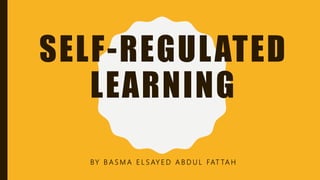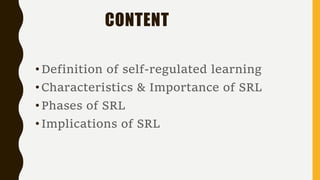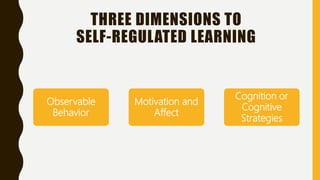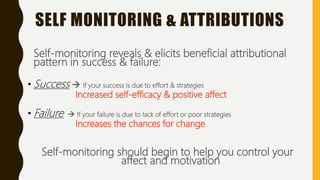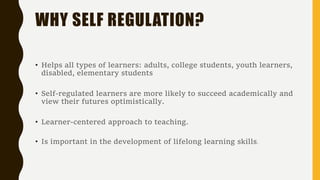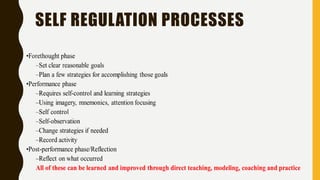Self regulated learning
- 1. SELF-REGULATED LEARNING BY B A S M A E L S AY E D A B D U L FAT TA H
- 2. CONTENT âĒDefinition of self-regulated learning âĒCharacteristics & Importance of SRL âĒPhases of SRL âĒImplications of SRL
- 3. DEFINITION OF SELF REGULATION Barry Zimmerman (2002) defines it as the process we use to activate and sustain our thoughts, behaviors, and emotions in order to reach our goals. ïą Students can actively activate their cognition, motivation, & behavior.
- 4. WHAT IS SELF REGULATION? ïĒ Not a mental ability, like intelligence ïĒ Not an academic skill ïĒ Itâs a self-directive process that learners can use to transform their intrinsic mental abilities into academic skills.
- 5. THREE DIMENSIONS TO SELF-REGULATED LEARNING Observable Behavior Motivation and Affect Cognition or Cognitive Strategies
- 6. TO BE CONT., SRL of Behavior âĒ Time, Study Environment, People, Resources SRL of Motivation & Affect âĒ Controlling motivation beliefs and anxieties SRL of Cognitive Strategies âĒ Rehearsal Strategies âĒ Elaboration Strategies âĒ Organization Strategies
- 7. SR OF BEHAVIOR IS ACTIVE CONTROL OF RESOURCES INCLUDING: âĒ Time â Time management; When you study; Distributed Practice âĒ Study Environment â Where; Temp, light, noise âĒ Peer â Who & When: alone, pairs, groups âĒ Faculty â Class questions, Office hours, E-Mail âĒ Textbook â Reading, studying, SQ4R âĒ Notes â Note taking skills, classroom attention, organization
- 8. SR AFFECT &MOTIVATION Will is our motivational orientation âĒ Goals âĒ Values âĒ Expectancies Skill is our use of the appropriate resources. âĒ Resource management âĒ Cognitive Strategies âĒ Reflection strategies
- 9. SELF MONITORING & ATTRIBUTIONS Self-monitoring reveals & elicits beneficial attributional pattern in success & failure: âĒ Success ï If your success is due to effort & strategies Increased self-efficacy & positive affect âĒ Failure ï If your failure is due to lack of effort or poor strategies Increases the chances for change Self-monitoring should begin to help you control your affect and motivation
- 10. Comparing Learning Strategies: Rehearsal vs. Elaboration vs. Organization
- 11. WHY SELF REGULATION? âĒ Helps all types of learners: adults, college students, youth learners, disabled, elementary students âĒ Self-regulated learners are more likely to succeed academically and view their futures optimistically. âĒ Learner-centered approach to teaching. âĒ Is important in the development of lifelong learning skills.
- 12. PHASES OF SR
- 14. HOW DO YOU DO IT?
- 15. CONCLUSION ïžThe key is to know yourself and keep your emotions in check. The best way to do that is to plan far in advance and use Distributed Practice. ïžIf you donât have the will, you wonât use the skill.

